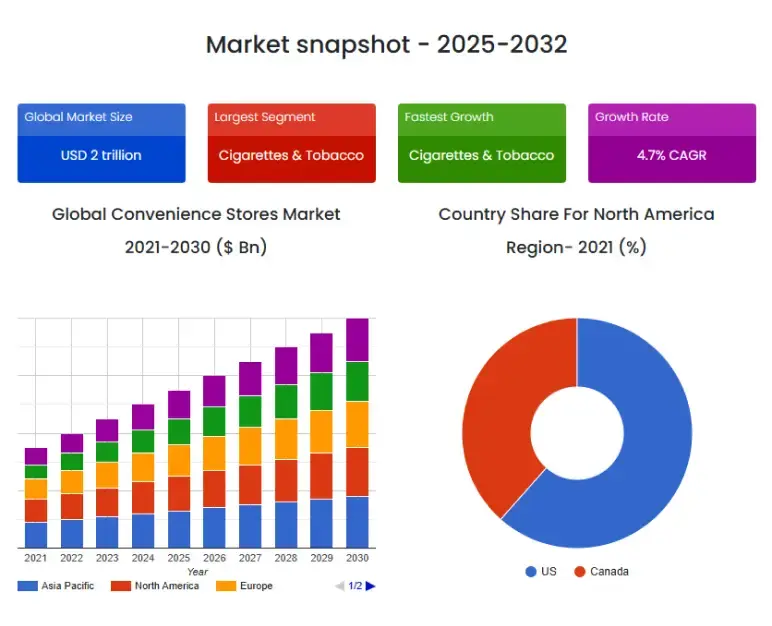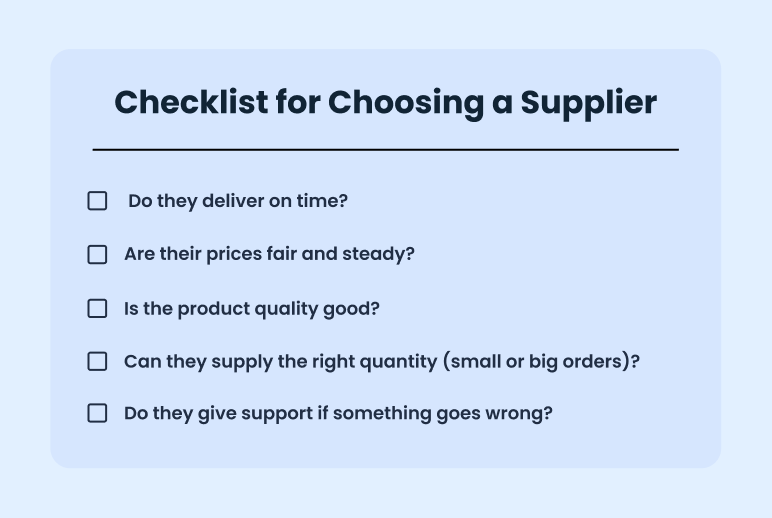Ever walked into your neighborhood convenience store for “just milk” and walked out with milk, chips, batteries, and maybe a lottery ticket? That’s the magic of this business.
A well-run convenience store isn’t just about selling everyday essentials—it’s about being the go-to spot when people need something now.
I’ve helped thousands of entrepreneurs turn ideas into profitable ventures through business planning, and I can tell you this: Convenience stores may look simple on the outside, but behind the counter, they’re all about strategy. Location, inventory, pricing, and even the coffee machine—all of it adds up to whether your store thrives or just survives.
In this guide, I’ll show you how to start a convenience store without tugging your hair. You’ll learn how to choose your store type, plan your budget, set up the shop, and bring in customers with simple marketing. By the end, you’ll know how to open your store with confidence.
Key Takeaways
- Starting a convenience store can cost $50k–$600k or more.
- Pick a busy place near homes, schools, or offices.
- Start with basics like milk, bread, snacks, and drinks.
- Keep the store clean, prices fair, and be friendly to customers.
Step 1: Decide your store type
The first step to start a convenience store is choosing what kind of store you want. You’ve got two main choices: an Independent store and a franchise store
Each has good and bad sides. Here’s a quick look:
| Type | Good sides | Bad sides |
|---|---|---|
| Independent |
|
|
| Franchise |
|
|
After this choice, think about what you want to sell. Most stores keep daily items like snacks, cold drinks, bread, milk, and toiletries. If your area allows, you can also sell alcohol, tobacco, or lottery tickets. Some stores even give extra services like an ATM or bill payment.
Next, decide your shop hours. Stores in busy places may need to stay open 24/7, while in smaller areas, long hours (but not all day) are enough.
By the end of this step, you will know your store type, what products you’ll sell, and when your store will be open.
Step 2: Research your local market
After you pick your store type, the next step is to study your market. This means knowing your customers and checking other shops nearby.
Start with the people around you:
- Families usually buy bread, milk, and groceries.
- Students often buy snacks, soft drinks, and quick meals.
- Office workers want coffee, bottled water, and simple lunch items.
- Travelers may stop for chips or a cold drink.
When you know your customers, you’ll know what to sell.
The reason this step matters is that demand for convenience stores is growing everywhere. In fact, the global convenience store market was about $2.09 trillion in 2024 and is expected to grow to $3.02 trillion by 2032.
Here’s a graph that shows this growth:

This growth shows people rely more on quick shopping than ever before.
Now, check other shops near you. Visit small stores, gas stations, and supermarkets. Look at what they sell, how busy they are, and how much they charge.
Finally, look for gaps. Maybe:
- They don’t offer fresh food products.
- Their prices are too high.
- Their customer service is not good.
These gaps are your chance to stand out and serve customers better.
By doing the market research, you’ll know what people want and how your store can be different.
Step 3: Find and secure a location
Where you open your store is one of the most important choices. A good location brings many customers. A bad location can make it hard to earn money.
When you look for a place, think about:
- How many people walk or drive by
- If there is parking and easy entry
- If the area is safe
- How much will the rent cost
Here’s a simple look at different location types:
| Location Type | Pros | Cons |
|---|---|---|
| Busy Street |
|
|
| Near Schools/Offices |
|
|
| Residential Area |
|
|
| Gas Station Area |
|
|
Before you sign, ensure the area allows a store. A strong location gives your store the best chance to succeed from the start.
Step 4: Write a simple business plan
Putting together a plan for your convenience store doesn’t need to feel overwhelming. You’re not writing a novel—just a short guide that spells out how you’ll run the store and what success will look like.
Too many people open their doors without thinking through basics like inventory costs, customer base, or how they’ll stand out, and that usually leads to headaches down the line.
Here’s what I suggest you include in your convenience store business plan:
- Products & services you’ll offer
- Startup costs and budget
- Pricing strategy
- Marketing plan
- Business goals
- Expected sales and profit
This can fit on just one or two pages. Unless you’re applying for bank financing, you don’t need a long, detailed report. The idea is to give yourself a roadmap so you’re running the business with intention instead of reacting as you go.
Not very good at writing? Need help with your plan?
Write your business plan 10X faster with Upmetrics AI
Plans starting from $14/month

Step 5: Budget your startup costs
Before you open your store, I want you to ask yourself:
- How much money do I need to get started?
- Can I afford a small store, or should I plan for a bigger one?
Making a budget will give you the answers. It shows what you must spend before opening and helps you avoid running short on money.
Here’s a rough idea of the costs for a small store and a big store:
| Item | Small Store | Big Store |
|---|---|---|
| Rent or Lease | $1,500–$2,500/month | $15,000–$25,000/month |
| Equipment | $12,000–$15,000 | $190,000–$210,000 |
| Inventory | $18,000–$20,000 | $185,000–$200,000 |
| Staff Wages | $2,500–$3,500/month | $15,000–$25,000/month |
| Marketing | $1,500–$2,500 | $20,000–$30,000 |
| Licenses & Permits | $1,500–$2,500 | $10,000–$15,000 |
| Total | $50,000–$60,000 | $590,000–$610,000 |
If your budget is tight, spend first on rent, equipment, and stock. Other things can be added later.
Making a budget gives you a clear picture of money, shows if you need funding, and helps you open your store with confidence.
Step 6: Register your business and get licenses
After you plan your costs, the next step is to make your store legal. This means you need to register your business and get the right licenses.
First, choose a business legal structure. You can run it as a sole proprietorship. This is the easiest way, but you take all the risk. I suggest an LLC (or a corporation if you’re thinking bigger) because, yeah, it costs a bit more, but it protects your personal money.
Next, register your store name. Pick a name that is short and easy to say. Ensure no one else is already using it in your area.
Now, apply for the licenses you’ll need. Every store must have a basic business license. If you plan to sell other items, you may also need:
- Food license
- Tobacco license
- Alcohol license
- Sales tax permit
- Fire and safety clearance (in some places)
Some cities will also send inspectors before you open. They may check health rules, fire safety, or food handling. Personally, I feel you should get all of this sorted early, instead of panicking a week before opening.
By the end of this step, your store will be officially registered and ready to open legally.
Step 7: Set up your store and hire staff
After you find your shop location, the next step is to set it up. I can’t tell you how much the look and feel of a store matters. Personally, I’d suggest going for clean and simple. If people can walk in, find what they need without stress, and feel good while doing it—they’ll keep coming back.
Start with the layout. Keep enough space so people can walk around without any trouble. Place daily items like milk, bread, and snacks where they’re easy to see and grab. Popular products should always be in clear view.
Now, think about the equipment you need:
- Shelves – For groceries, snacks, and other items
- Refrigerators – For drinks and dairy
- Freezers – For frozen food and ice cream
- POS system (billing machine) – For fast and simple payments
- Security cameras – To keep the store safe
Good lighting is also important. Bright lights make the store look fresh and help products stand out. Clear signs help people find what they need quickly.
Next, think about the staff. Even a small store runs better with extra help. Hire people who are:
✅ Friendly and polite
✅ Honest and trustworthy
✅ Quick to learn and help customers
✅ Able to handle cash and stock items
Give them simple training and treat them well. Happy staff serve better, and this keeps customers coming back.
Oh, and safety—I can’t forget that. Keep floors clean, wires covered, and put heavy items on lower shelves.
A well-set store with good staff makes shopping easy and enjoyable.
Step 8: Stock your inventory
Now it’s time to fill your store with products. Start with daily items people always buy—milk, bread, rice, snacks, soft drinks, and simple household things. Later, you can add more products when you see what your customers like.
I think getting good suppliers is very important. A reliable supplier makes sure:
- Your shelves don’t go empty
- Prices stay fair
- Products reach you on time
But how do you know if a supplier is good for you? Use this simple checklist:

It’s also smart to have a backup supplier for important items like milk, water, and cold drinks. If one supplier is late, the other can help.
When starting, don’t buy too much stock. Keep it small and watch what sells fast. Later, order more of those popular items.
A store with full shelves makes shopping easy and brings customers back again.
Step 9: Set your pricing strategy
After you stock your shelves, the next step is to set prices. This is your pricing strategy, and it’s very important. If prices are too high, people may shop somewhere else. If prices are too low, you won’t earn enough. The best plan is to cover your costs, stay close to competitors, and still make a profit.
Start by checking what nearby stores are charging. Then, set your own prices in a way that covers your costs and still gives you a profit.
Here’s a small example with a soda bottle:
| Item | Your Cost Price | Store A Price | Store B Price | Smart Price Range |
|---|---|---|---|---|
| Soda (500 ml) | $1.00 | $1.50 | $2.00 | $1.50–$1.70 |
👉 If you sell at $1.50, you match Store A and stay competitive. You’ll earn $0.50 profit per bottle.
👉 If you sell at $1.70, you earn more ($0.70 profit), while still being cheaper than Store B.
You can follow the same method for other products. Here’s a simple guide:
| Item Type | Pricing Tip | Example |
|---|---|---|
| Daily Needs (milk, bread, eggs) | Keep prices close to other stores. These items bring people in. | If milk costs $1, sell for $1.20–$1.30 |
| Snacks & Drinks | Add more profit here since people buy them often. | If chips cost $0.50, sell for $1.00 |
| Special Items (alcohol, tobacco, lottery) | Often fixed prices. Profit is small but steady. | – |
| Extra Services (ATM, bill pay, recharge) | Add a small fee. People pay for the convenience. | $1–$3 service fee |
By the end of this step, you’ll have prices that cover your costs, give you profit, and still look fair to customers.
Step 10: Marketing your store
Once your shop is ready, you need to tell people about it. If people don’t know your shop, they won’t come in. Simple marketing ideas can help bring new customers and make old customers return.
I say, start with a big, clear signboard. It should be easy to see from the road, so people can find your shop quickly.
Next, use flyers and posters. Share them in nearby streets with your shop name, address, and offers. Here’s an example:

Oh, and please add your shop to Google Maps. I can’t tell you how many times I’ve searched “grocery store near me,” and only the smart ones who bothered to list themselves showed up. It’s free and super effective. So why not?
Plan some opening offers for the first few days, like small discounts or a free item with purchase. This creates interest and makes people want to visit.
For the future, think about loyalty cards to reward regular customers. You can also give bundle deals, like “buy milk and bread together and save money.” Small offers like these make shopping more fun and keep customers happy.
You don’t need to spend a lot of money. Simple and regular promotion is enough to make your store popular in the area.
Step 11: Open your doors and grow
The big day has arrived—I can almost feel the excitement for you! Your shelves are full, the fridges are stocked, and your staff is ready. You switch on the lights, open the doors, and welcome your first customers.
Some walk in because they saw your flyers, some come for the opening deals, and others stop by out of curiosity.
Here’s what I always remind myself about opening day: Focus on service. Smile, greet people, and ensure they find what they need. I can’t stress this enough: A good first impression will make them come back. Keep the store clean, shelves stocked, and checkout fast.
After opening, watch closely:
- Which products sell fast
- Which items don’t move
- What customers ask for
This helps you adjust your stock. For example, if snacks and drinks sell quickly, order more. If something doesn’t sell, buy less. If customers ask for new items, try adding them.
As you get stable, think about growth:
- Add extra services like ATM, bill payment, or delivery.
- Run loyalty programs to keep regular customers.
- If sales stay strong, plan a second store in another good area.
Opening day is just the start. Growing your store comes from good service, the right products, and listening to your customers every day.
5 Common mistakes to avoid when starting a convenience store
Starting a convenience store looks easy, but many beginners face the same problems. The good news is that most mistakes can be fixed if you know them early.
1. Stocking for yourself, not your customers
I’ve seen new store owners treat their shelves like a personal pantry—stuffed with products they like. But here’s the truth: Your customers don’t care about your favorite biscuits; they care about what’s missing from their kitchen at 10 PM.
So, track the fast movers—milk, bread, eggs, snacks, soft drinks. Better yet, talk to your regulars. Ask them what they usually run out of, then adjust your shelves.
2. Underestimating startup costs
Many first-timers budget only for rent and stock, then panic when they realize they also need chillers, billing machines, signage, licenses, or extra staff. Suddenly, the “profitable store” dream feels like a money pit.
The solution? Create a complete startup budget. Think beyond shelves and rent—include equipment, permits, utilities, and working capital. If the full setup feels heavy, start lean and expand as cash flow improves.
3. Choosing the wrong location
Cheap rent is tempting, I totally get it. But a quiet street with no foot traffic is a slow business death. Convenience stores thrive on impulse purchases and daily needs—you can’t sell if no one’s walking past your door.
I suggest you prioritize visibility and access. Locations near schools, offices, hostels, or busy intersections are gold mines. Yes, you’ll pay more rent, but the traffic will pay it back.
4. Relying on a single supplier
One supplier may seem convenient—until they delay deliveries or hike prices. Empty shelves are the fastest way to lose customers; they won’t wait, they’ll walk into the store next door.
There’s an easy fix. Always have at least two backup suppliers. Compare not just prices, but also reliability and service speed. A resilient supply chain keeps your shelves—and your cash register—full.
5. Believing “If I build it, they’ll come”
Some owners assume people will magically discover their store. Reality check: if customers don’t know you exist, your prime location and perfect stock mean nothing.
Instead, put your store on the map—literally. A clear signboard, flyers in the neighborhood, a Google Maps listing, and small opening offers go a long way. Convenience store marketing doesn’t need to be fancy, but it does need to be visible.
Final thoughts
Opening a convenience store is a good way to serve your neighborhood and earn a steady income. You’ll enjoy parts like meeting regular customers and helping with daily needs. You’ll also face challenges, such as keeping stock full, setting the right prices, and handling competition. That’s normal in business.
A simple plan makes everything easier. With Upmetrics, you can create a business plan quickly. From budgeting your startup costs to planning promotions, Upmetrics gives you the tools to stay on track, avoid mistakes, and grow with confidence.
Keep your store simple, give fair prices, and treat customers well. With the right plan and good service, your convenience store can grow into a trusted place in your community.
The Quickest Way to turn a Business Idea into a Business Plan
Fill-in-the-blanks, AI-assistance, and automatic financials make it easy.



